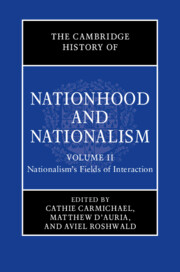Book contents
- The Cambridge History of Nationhood and Nationalism
- The Cambridge History of Nationhood and Nationalism
- The Cambridge History of Nationhood and Nationalism
- Copyright page
- Contents
- Figures
- Tables
- Contributors
- Part I Imperial and Postcolonial Settings
- 1 Building Nation-Empires in the Eighteenth-Century Iberian Atlantic
- 2 Nations and Nationalisms in the Late Ottoman Empire
- 3 The Dutch Empire
- 4 The Habsburg Monarchy
- 5 The British Empire
- 6 The French Empire
- 7 Germany as a “Global Nation,” 1840–1930
- 8 The Russian and Soviet Empire
- 9 The Japanese Empire
- 10 American Internationalism
- 11 The Indian Subcontinent: From Raj to Partition
- 12 Middle Eastern and North African Nationalisms
- 13 African Nationalisms
- 14 Bringing Empires Back in: The Imperial Origins of Nations in Indochina
- Conclusion to Part I
- Part II Transnational and Religious Missions and Identities
- Part III Intersections: National(ist) Synergies and Tensions with Other Social, Economic, Political, and Cultural Categories, Identities, and Practices
- Index
- References
5 - The British Empire
from Part I - Imperial and Postcolonial Settings
Published online by Cambridge University Press: 08 November 2023
- The Cambridge History of Nationhood and Nationalism
- The Cambridge History of Nationhood and Nationalism
- The Cambridge History of Nationhood and Nationalism
- Copyright page
- Contents
- Figures
- Tables
- Contributors
- Part I Imperial and Postcolonial Settings
- 1 Building Nation-Empires in the Eighteenth-Century Iberian Atlantic
- 2 Nations and Nationalisms in the Late Ottoman Empire
- 3 The Dutch Empire
- 4 The Habsburg Monarchy
- 5 The British Empire
- 6 The French Empire
- 7 Germany as a “Global Nation,” 1840–1930
- 8 The Russian and Soviet Empire
- 9 The Japanese Empire
- 10 American Internationalism
- 11 The Indian Subcontinent: From Raj to Partition
- 12 Middle Eastern and North African Nationalisms
- 13 African Nationalisms
- 14 Bringing Empires Back in: The Imperial Origins of Nations in Indochina
- Conclusion to Part I
- Part II Transnational and Religious Missions and Identities
- Part III Intersections: National(ist) Synergies and Tensions with Other Social, Economic, Political, and Cultural Categories, Identities, and Practices
- Index
- References
Summary
Empire, in the Western tradition, was a unitary and universal thing. There was and could be only one empire at any one time, and it was, in principle at least, a world empire. In this case, all roads led to and from Rome. Herodotus had introduced the idea, if not the term, of translatio imperii, the transfer of empire from one ruler to another. In his account the succession was from the Assyrians to the Medes, to the Persians. Later writers saw the Macedonians, in the person of Alexander the Great, as successor to the Persians, and later still it was relatively easy to see the Romans, with their admiration for Greek culture, as heirs to the Hellenistic empire of Alexander.
Keywords
- Type
- Chapter
- Information
- The Cambridge History of Nationhood and Nationalism , pp. 88 - 107Publisher: Cambridge University PressPrint publication year: 2023



